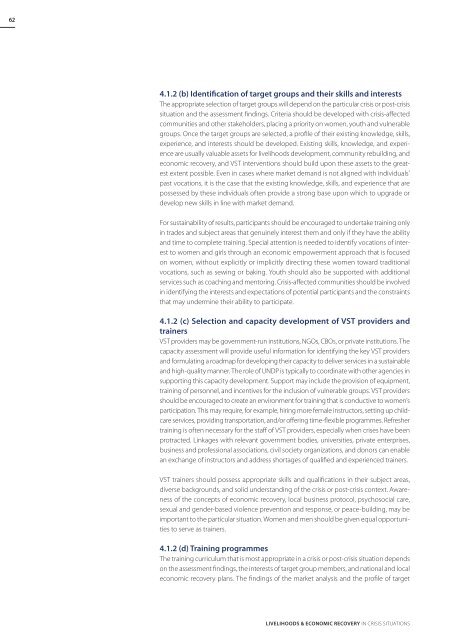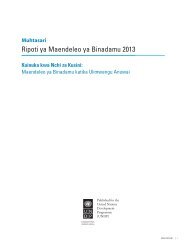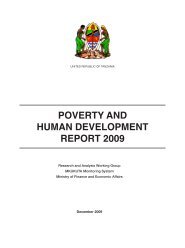Download PDF (4.08 MB) - ReliefWeb
Download PDF (4.08 MB) - ReliefWeb
Download PDF (4.08 MB) - ReliefWeb
You also want an ePaper? Increase the reach of your titles
YUMPU automatically turns print PDFs into web optimized ePapers that Google loves.
62<br />
4.1.2 (b) Identification of target groups and their skills and interests<br />
The appropriate selection of target groups will depend on the particular crisis or post-crisis<br />
situation and the assessment findings. Criteria should be developed with crisis-affected<br />
communities and other stakeholders, placing a priority on women, youth and vulnerable<br />
groups. Once the target groups are selected, a profile of their existing knowledge, skills,<br />
experience, and interests should be developed. Existing skills, knowledge, and experience<br />
are usually valuable assets for livelihoods development, community rebuilding, and<br />
economic recovery, and VST interventions should build upon these assets to the greatest<br />
extent possible. Even in cases where market demand is not aligned with individuals’<br />
past vocations, it is the case that the existing knowledge, skills, and experience that are<br />
possessed by these individuals often provide a strong base upon which to upgrade or<br />
develop new skills in line with market demand.<br />
For sustainability of results, participants should be encouraged to undertake training only<br />
in trades and subject areas that genuinely interest them and only if they have the ability<br />
and time to complete training. Special attention is needed to identify vocations of interest<br />
to women and girls through an economic empowerment approach that is focused<br />
on women, without explicitly or implicitly directing these women toward traditional<br />
vocations, such as sewing or baking. Youth should also be supported with additional<br />
services such as coaching and mentoring. Crisis-affected communities should be involved<br />
in identifying the interests and expectations of potential participants and the constraints<br />
that may undermine their ability to participate.<br />
4.1.2 (c) Selection and capacity development of VST providers and<br />
trainers<br />
VST providers may be government-run institutions, NGOs, CBOs, or private institutions. The<br />
capacity assessment will provide useful information for identifying the key VST providers<br />
and formulating a roadmap for developing their capacity to deliver services in a sustainable<br />
and high-quality manner. The role of UNDP is typically to coordinate with other agencies in<br />
supporting this capacity development. Support may include the provision of equipment,<br />
training of personnel, and incentives for the inclusion of vulnerable groups. VST providers<br />
should be encouraged to create an environment for training that is conductive to women’s<br />
participation. This may require, for example, hiring more female instructors, setting up childcare<br />
services, providing transportation, and/or offering time-flexible programmes. Refresher<br />
training is often necessary for the staff of VST providers, especially when crises have been<br />
protracted. Linkages with relevant government bodies, universities, private enterprises,<br />
business and professional associations, civil society organizations, and donors can enable<br />
an exchange of instructors and address shortages of qualified and experienced trainers.<br />
VST trainers should possess appropriate skills and qualifications in their subject areas,<br />
diverse backgrounds, and solid understanding of the crisis or post-crisis context. Awareness<br />
of the concepts of economic recovery, local business protocol, psychosocial care,<br />
sexual and gender-based violence prevention and response, or peace-building, may be<br />
important to the particular situation. Women and men should be given equal opportunities<br />
to serve as trainers.<br />
4.1.2 (d) Training programmes<br />
The training curriculum that is most appropriate in a crisis or post-crisis situation depends<br />
on the assessment findings, the interests of target group members, and national and local<br />
economic recovery plans. The findings of the market analysis and the profile of target<br />
Livelihoods & Economic Recovery in Crisis Situations





